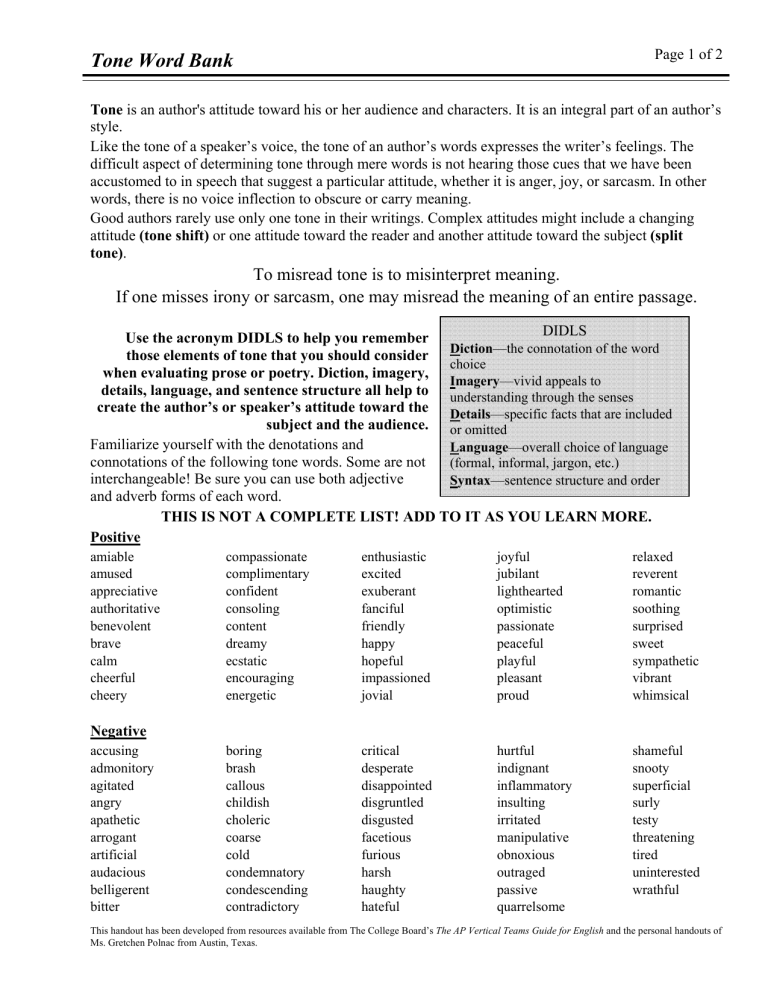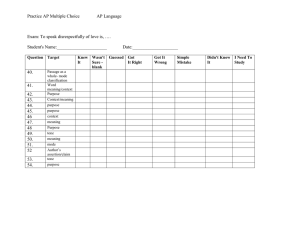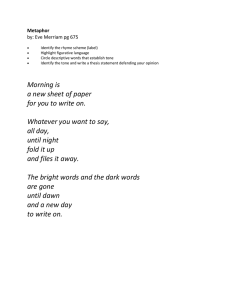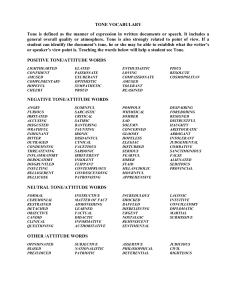
Page 1 of 2 Tone Word Bank Tone is an author's attitude toward his or her audience and characters. It is an integral part of an author’s style. Like the tone of a speaker’s voice, the tone of an author’s words expresses the writer’s feelings. The difficult aspect of determining tone through mere words is not hearing those cues that we have been accustomed to in speech that suggest a particular attitude, whether it is anger, joy, or sarcasm. In other words, there is no voice inflection to obscure or carry meaning. Good authors rarely use only one tone in their writings. Complex attitudes might include a changing attitude (tone shift) or one attitude toward the reader and another attitude toward the subject (split tone). To misread tone is to misinterpret meaning. If one misses irony or sarcasm, one may misread the meaning of an entire passage. DIDLS Use the acronym DIDLS to help you remember Diction—the connotation of the word those elements of tone that you should consider choice when evaluating prose or poetry. Diction, imagery, Imagery—vivid appeals to details, language, and sentence structure all help to understanding through the senses create the author’s or speaker’s attitude toward the Details—specific facts that are included subject and the audience. or omitted Familiarize yourself with the denotations and Language—overall choice of language connotations of the following tone words. Some are not (formal, informal, jargon, etc.) interchangeable! Be sure you can use both adjective Syntax—sentence structure and order and adverb forms of each word. THIS IS NOT A COMPLETE LIST! ADD TO IT AS YOU LEARN MORE. Positive amiable amused appreciative authoritative benevolent brave calm cheerful cheery compassionate complimentary confident consoling content dreamy ecstatic encouraging energetic enthusiastic excited exuberant fanciful friendly happy hopeful impassioned jovial joyful jubilant lighthearted optimistic passionate peaceful playful pleasant proud relaxed reverent romantic soothing surprised sweet sympathetic vibrant whimsical boring brash callous childish choleric coarse cold condemnatory condescending contradictory critical desperate disappointed disgruntled disgusted facetious furious harsh haughty hateful hurtful indignant inflammatory insulting irritated manipulative obnoxious outraged passive quarrelsome shameful snooty superficial surly testy threatening tired uninterested wrathful Negative accusing admonitory agitated angry apathetic arrogant artificial audacious belligerent bitter This handout has been developed from resources available from The College Board’s The AP Vertical Teams Guide for English and the personal handouts of Ms. Gretchen Polnac from Austin, Texas. Page 2 of 2 Tone Word Bank Sorrow/Fear/Worry aggravated agitated anxious apologetic apprehensive concerned confused dejected depressed despairing disturbed embarrassed fearful foreboding gloomy grave hollow hopeless horrific horror lugubrious melancholy miserable morose mournful nervous numb ominous paranoid pessimistic pitiful poignant regretful remorseful resigned sad serious sober solemn somber staid upset cynical disdainful droll facetious flippant giddy humorous insolent ironic irreverent joking malicious mock-heroic mocking mock-serious patronizing pompous quizzical ribald ridiculing sad sarcastic sardonic satiric scornful sharp silly taunting teasing whimsical wry disinterested dramatic earnest expectant factual fervent formal forthright frivolous histrionic humble incredulous informative inquisitive instructive intimate judgmental learned loud lyrical matter-of-fact meditative nostalgic objective obsequious patriotic persuasive pleading pretentious provocative questioning reflective reminiscent resigned restrained seductive sentimental serious shocking sincere smooth unemotional urgent vexed wistful zealous Humor/Irony/Sarcasm amused bantering bitter caustic comical condescending contemptuous critical Miscellaneous allusive apathetic authoritative baffled candid ceremonial clinical contemplative conventional detached didactic disbelieving This handout has been developed from resources available from The College Board’s The AP Vertical Teams Guide for English and the personal handouts of Ms. Gretchen Polnac from Austin, Texas.



